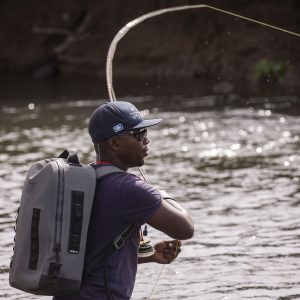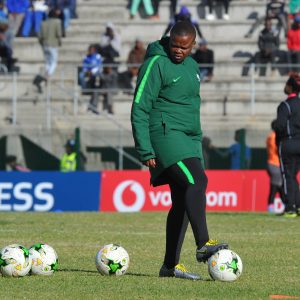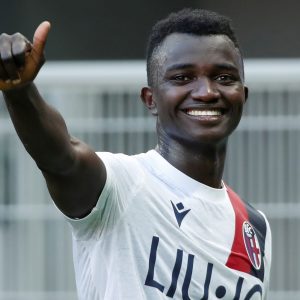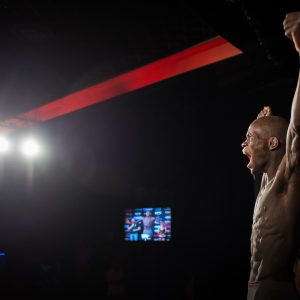Africa’s one-in-a-billion gift to baseball
Gift Ngoepe, the first African to play in Major League Baseball, has found that tag burdensome. But it has also inspired him to shine, for the continent and his late mother.
Author:
18 December 2020

For $19.99 (just over R300), delivery excluded, you can purchase a polycotton T-shirt from the Pittsburgh Clothing Company. In 11 different colours, including military green and espresso, these shirts have the word “gift” printed across their fronts. The “i” is dotted with the continent of Africa. Underneath is the fraction 1/1,200,000,000.
Mpho Gift Ngoepe owns one of these shirts. And so he should. The Pittsburgh Clothing Company made them, as well as hoodies and vests, in recognition of his unique achievement. On 26 April 2017, the 30-year-old from Polokwane represented the Pittsburgh Pirates at PNC Park, making him the first person from Africa – with its population of 1.2 billion people – to play Major League Baseball (MLB).
“It’s pretty crazy when I stop and think about it,” says Ngoepe from his home near Daytona Beach in Florida, weeks before he moved to Australia, where he will turn out for the Melbourne Aces in the Australian Baseball League that starts on 18 December. “I’m so blessed. The life I’ve lived and the experiences I’ve had almost seem impossible. The odds of me making it were huge.”
Before Ngoepe made his debut, every other continent (with Antarctica still the exception) had MLB representation. Harry Wright from the United Kingdom kicked things off for Europe in 1871 and by 1939, baseball aficionados across the Americas, Asia and Australasia could look at the long list of MLB players and envisage a path to the big leagues. Even those born at sea, such as Ed Porray, who was born in the Atlantic Ocean and went on to play three times for the Buffalo Buffeds in 1914, were not limited by their watery birthplace. But for 171 years, African talent was ignored. What took so long?
Related article:
“Many players have signed with teams in the past, but for whatever reason none could make the step to the majors,” Ngoepe explains. “There were South Africans, too [five before him]. Ian Holness [who represented South Africa in the 1998 Baseball World Cup and the 2000 Olympic Games] was a guy who I looked up to and had a trial with the Los Angeles Dodgers. I can’t say why I made it and others didn’t. Maybe there’s something in my character or my story that’s given me something special.”
It was poor health that saw Ngoepe leave Limpopo when he was just three years old. His grandmother could not cope with his wailing screams and he was sent to live with his mother Maureen in Randburg in northwest Johannesburg.
Maureen made ends meet as a domestic worker. One of her jobs involved cleaning the clubhouse of the Randburg Mets three days a week. In addition to her modest wage, she was allowed to live in the small room next to the field. With her three sons, she turned the 3x3m room into a home.
“It was always filled with laughter,” Ngoepe says. “We cried, we lost a person in that home, we had great times, we celebrated many things. I learned that size doesn’t matter as long as you’ve got a lot of heart.”
Small man, big dreams
Ngoepe has spent his life looking up at his contemporaries. At 1.73m, he is 12cm shorter than the average MLB player. Scouts and selectors have perennially questioned his prowess on the field because of his stature.
His interest in baseball was inevitable given his proximity to the sport. It was the sound of the ball popping in gloves and the tinny ping it made when leaving an aluminium bat that first grabbed Ngoepe’s attention. When he was old enough to do so, he’d spend hours hurling a ball against a fence. His coach was impressed and invited him to join the team.
Ngoepe’s rise was meteoric. By the age of 10, he was wearing his country’s colours. But being a big fish in a small pond was never going to satisfy his ambitions. In 2008, at one of the MLB’s annual European academies in Tirrenia, Italy, a scout from Pittsburgh offered him a contract worth $10 000. Despite his mother’s protestations, he took a gamble on his future.
“My mom asked me to stay in South Africa,” Ngoepe says. “We were so close and she didn’t want me to leave. She once said, ‘Why not stay and play soccer instead so you can be with your family? If you go to America, things will be tough.’ She wasn’t wrong.”
Writing for The Players’ Tribune, Ngoepe admits that he almost abandoned his odyssey just as it began. “I missed her so much,” he said. “I had a tough time making friends. I got extremely homesick. No one understood me. They didn’t know what to make of this little guy from South Africa.”
Related article:
There are 30 MLB baseball franchises, each with several affiliates in the minor leagues. Altogether, there are 261 feeder teams divided across a hierarchy nicknamed the “farm system”. Ngoepe started on the lowest rung, known as the rookie level, with the Gulf Coast League Pirates in 2009, prompting Sports Illustrated magazine to run an article about his journey, titled A Gift from Africa. A season later he had ascended to the next rung and a season after that, he had climbed another.
A hand injury in 2011 hampered his progress but a productive 2012, which included 124 games played, put him back on track. Then his world collapsed and almost proved his undoing.
In 2013, Maureen was diagnosed with pneumonia. Ngoepe returned home and spent five days at his mother’s hospital bed before she died. “I was ready to give up again,” he says. “I was all set to stay home.”
Related article:
His form on the field had dipped from the heights of the previous year. Now, without the stability his mother provided, the weight of a continent began to press down on him.
“The pressure to be Africa’s first player in the majors has been heavy at times,” Ngoepe says. “I felt like I was letting down so many people. So many people said I wouldn’t do it. That I wouldn’t be the one to put Africa on the baseball map. There were times I believed them.”
It was in these moments that his mother’s voice would ring through the darkness. It compelled Ngoepe to persevere. To return to the United States and doggedly chase a dream that had become a compulsion.
Fighting his way to the major league
For four years, Ngoepe grafted in the minors. During the season, he’d train in the morning and play matches in the evening. Four days in Toledo, a week in Indianapolis, five days in Louisville, then back in Indianapolis. Minor league baseball is a ceaseless cycle of travel and play, travel and play. Everyone is hungry. Everyone is talented. Everyone is desperate for that one chance that will change their life.
Ngoepe got the call on 25 April 2017. Pack your bags, son. You’ve made it. Fate had other ideas. His flight back to Pittsburgh was cancelled, which meant he’d take his first bow on centre stage a day later. Fittingly, it was on Freedom Day in South Africa.
“It does seem scripted,” Ngoepe says. “It was meant to happen.”
He entered the game at the top of the fourth innings. His heart was beating so fast that two teammates could feel it thumping beneath his ribs. The Chicago Cubs scored two runs to reduce the gap to two. Ngoepe would lead his team in their fourth dig.
“In the build-up to the game, my thoughts were on the significance of me being there and what it meant for Africa,” he explains. “When I first stepped on the field, that was for my mom. But when I stepped on to the plate, that was for me. No matter what I did after that would be a bonus. I’d made it.”
Related article:
Hoping to make his first act in the big leagues a miserable one was Jon Lester. A 1.93m, five-time All-Star, triple World Series-winning pitcher with an arm like a rocket and snarl to match.
The first pitch went away from Ngoepe and was called a ball. Another one followed. Ngoepe fouled the next one into the stands, but another shout of “ball” from the umpire calmed his nerves. He knew that he was in a strong position. All he needed was patience.
Lester’s fast ball straight over home plate was met with a violent swing of the bat. The connection was clean. “A major league hit,” as Ngoepe describes it. “No one can say I got lucky. It is a moment I will cherish for the rest of my life.”
Ngoepe’s career has not gone as he had hoped. Later that year he was traded to the Toronto Blue Jays, where he had one hit in 19 at bats. He has not returned to the majors since.
Likened to a baseball legend
No matter what he does from here, though, Ngoepe’s legacy is secure. Jesse Washington, a respected journalist with The Undefeated website, called Ngoepe “the Jackie Robinson of the motherland”. For an African American writer to compare one of South Africa’s own to one of the most important figures in all of sport speaks volumes.
Robinson was the first player to break baseball’s colour line when he represented the Brooklyn Dodgers in 1947. The Hall of Fame second baseman kicked a hole in white America’s racist wall. Once he stepped through it, scores of black baseball players followed.
That is where the comparison between Ngoepe and Robinson breaks down. Apart from South African pitcher Tayler Scott, who played a combined 13 games for the Seattle Mariners and the Baltimore Orioles in 2019, no other African has stood on a MLB field.
Related article:
“I’d love to look back on my life and be able to say, ‘I did something for baseball in Africa,’” Ngoepe says. He alludes to work being done in various countries on the continent but does not reveal too much as “plans are still in the works”.
Ngoepe’s smile, which has been ever present throughout our conversation over Zoom, fades when he speaks of the diminished standards in South African baseball. He understands that the sport has to make do with what athletic talent is left over from better resourced and more popular codes. He says he feels “alone” at times and wishes there were others who could emphasise the dormant potential on a continent of 1.2 billion people.
For now, he’s focused on his own game. On the wrong side of 30 for a player, another shot in the majors might be beyond him. So wherever he plays, he is determined to squeeze out every ounce of baseball he has left in him. And if he ever feels despondent, he simply has to look at a T-shirt bearing his name to remind him of his unlikely story.





